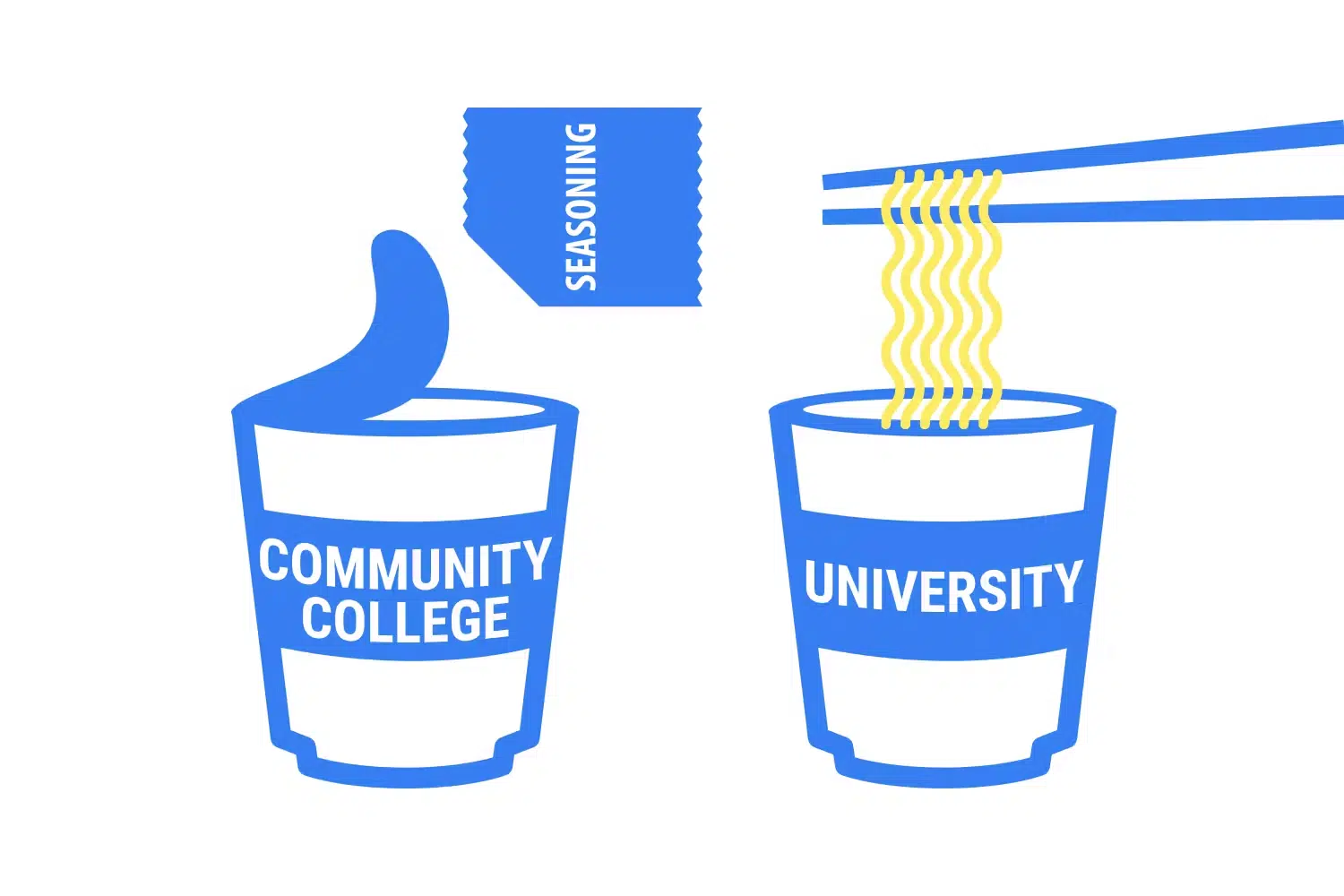
Community College or University: Making the Right Choice for You

If you’re the parent of a teenager, a high school student on the verge of graduation, or someone who wants to finally complete their degree, it’s likely that you’ve been thinking about post-secondary education options. The advantages of a higher education degree have likely been drilled into you ad nauseum, especially promises of a higher lifetime income and better quality of life.
However, there are a variety of options available to potential students when it comes to what type of institution to attend. The most common are community college or a 4-year university—but how are you to decide? Because each type of institution offers its own set of pros and cons, choosing between the two isn’t always clear-cut. Here, we lay out a few questions you may want to consider before making a decision.
Just a quick note: We don’t provide student loans or financial advice for students. This is basic information and should be used as a starting point—not firm guidance. Your future is important, and it’s best to gather as much information as you possibly can before making a decision!
Fee-Free Banking is Here
Looking for a financial institution that doesn’t nickel and dime you? If you live or work in Texas, join Amplify!
What’s Your Budget?
To access the benefits of a tertiary degree at a 4-year university, you have to make a substantial up-front investment. The cost of university can range from around an astounding $100,000 at a public 4-year university, to over $200,000 at a private university.
Community college, on the other hand, is much more affordable. Texas residents are fortunate to live in a state with one of the lowest community college tuition rates. With an average yearly tuition of just $2,885, achieving an Associate’s degree on a limited income becomes much more feasible in the Lone Star State.
How Much Flexibility Do You Need?
If you already have a hectic schedule and can’t devote yourself full-time to studying, your most pressing issue may be the time you have available to attend classes. Perhaps you’re constrained by your job, by childcare, by transportation or by other limitations. Unfortunately, not many four-year universities offer night classes or completely online options.
If you find your study options limited by your schedule, community college might be a good option for you. These two-year colleges generally have more flexible schedules that can accommodate non-traditional students with full or part-time jobs.
How Does the Academic Quality Compare?
Community colleges have made strides to improve the quality and value of their instructors and course offerings in recent years. In fact, many have lost their previous stigma about being academically inferior to universities. However, before you make a decision, research the academic status of the specific school you’re considering; while some studies have shown community colleges to be a better investment than universities in terms of capacity for lifetime earnings, others point to consistently lower educational standards at community colleges.
What Classroom Conditions Suit You Best?
Another factor to consider is whether you learn better in the smaller classes typically offered by two-year schools or the larger lecture-hall courses often offered by many four-year institutions.
- Depending on the size of the school, you may learn in large lecture halls or classrooms, with less opportunity for one-on-one interaction with your instructors.
- On the other hand, community colleges usually offer class sizes of fewer than 20 people, with more opportunities to get to know your instructors.
- Both universities and community colleges offer online classes—but they can vary substantially between institutions. Some offer a video and on-camera experience, while others are simply materials and tests.
- Not every institution offers the same accommodations for disabilities. If you need accommodations, make sure they can answer exactly what accommodations they offer, when they offer them, who they offer them to, and how they can further support you. You don’t need to disclose any medical information up front—just be specific with your needs and questions. There are some schools that require proof of disability, but that step can happen after you’re accepted into a program.
Before you decide on any school, be sure to inquire about the classroom experience—the student to teacher ratio, the style of classes, and accommodations for disabilities can all make a big difference in your overall experience!
Who Do You Want to Learn From?
Larger four-year universities usually offer classes that are either taught by highly educated professors with master’s or doctorate degrees, or by graduate students. In some cases—if the course sizes are especially large—you may interact primarily with graduate students who serve as teaching assistants.
Professors and instructors at four-year universities may have spent the majority of their careers in academia. While obviously their experience is still valuable, they may not be able to offer real-world insights on what your career will look like post-graduation.
In contrast, at a community college, your classes are more likely to be taught by professionals with long years of experience in your chosen area of study—many of whom might also hold high-level degrees. These instructors may be able to provide a more accurate assessment of what your job prospects are upon graduation.
This is far from a rule, and it’s important to evaluate potential professors on an individual basis. A simple internet search is a great start, but you may also be able to ask direct questions to the program itself.
What Are Your Long-Term Goals?
When weighing the pros and cons between community college and a four-year university, you’ll also want to consider what your career goals are for the future. If you’re determined to become a doctor, lawyer, or enter into another profession that requires even more education after achieving a Bachelor’s degree, a four-year university might be the best option for you.
Often, the same university will offer the advanced degree you may want to pursue after you graduate with your B.A. or B.S., or have resources to help you gain entry into the graduate program of your choice. By attending a 4-year university from the beginning of your post-secondary education, you’ll have the opportunity to cultivate relationships with faculty and make connections in your future career field—an advantage that most community colleges cannot offer.
Conversely, if a community college offers a great program for a career that doesn’t require a Bachelor’s or above, you can get a significant head start on your career while being a little more frugal. Talking to professionals in your area of interest is a great way to judge which kind of institution is right for your career goals.
Consider A Dual Approach
If you know that you ultimately want to graduate with a Bachelor’s degree, but are trying to do so with limited resources, it’s still possible to earn a four-year degree for less overall cost. In fact, many students make the best of both worlds by earning as many general credits at the community college level as possible, then transferring to a four-year university for their more specialized courses.
Before you decide to pursue this route, ensure all your credits will apply toward your eventual bachelor’s degree at a university. To do so, make sure to talk to academic advisors at both institutions to double check that your transfer plans are going to work.
Make the Decision That’s Right for You
There is no universally correct answer here. If saving money is important to you, the credits are transferable, and your career will be supported, community college is a great way to start. If you have the resources, your career is supported, and you want a more conventional college experience, a university might be the right choice for you.
The most important question in all of this is what serves you the most? This decision may be one of the first major adult decisions you make in your life—it’s ok to be overwhelmed and confused. Talking to as many professionals, teachers, professors, and financial aid offices can help you gather the information you need to make a reasonable and well-thought-out decision.
Become an Amplify Member
Every Amplify account holder enjoys fee-free banking. That means no overdraft, maintenance, or other banking fees cutting into your pocket.




